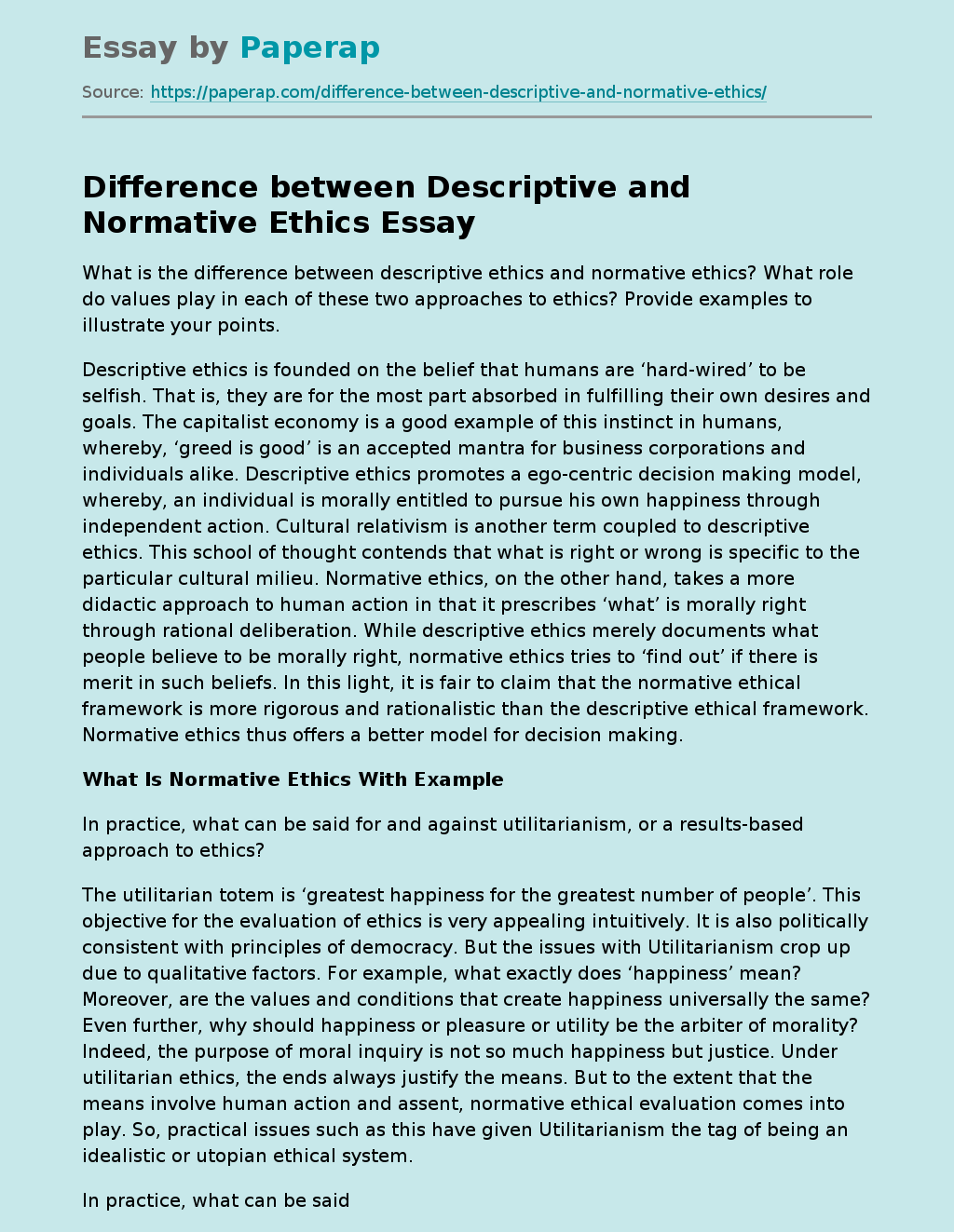Difference between Descriptive and Normative Ethics
What is the difference between descriptive ethics and normative ethics? What role do values play in each of these two approaches to ethics? Provide examples to illustrate your points.
Descriptive ethics is founded on the belief that humans are ‘hard-wired’ to be selfish. That is, they are for the most part absorbed in fulfilling their own desires and goals. The capitalist economy is a good example of this instinct in humans, whereby, ‘greed is good’ is an accepted mantra for business corporations and individuals alike.
Descriptive ethics promotes a ego-centric decision making model, whereby, an individual is morally entitled to pursue his own happiness through independent action. Cultural relativism is another term coupled to descriptive ethics. This school of thought contends that what is right or wrong is specific to the particular cultural milieu. Normative ethics, on the other hand, takes a more didactic approach to human action in that it prescribes ‘what’ is morally right through rational deliberation. While descriptive ethics merely documents what people believe to be morally right, normative ethics tries to ‘find out’ if there is merit in such beliefs.
In this light, it is fair to claim that the normative ethical framework is more rigorous and rationalistic than the descriptive ethical framework. Normative ethics thus offers a better model for decision making.
What Is Normative Ethics With Example
In practice, what can be said for and against utilitarianism, or a results-based approach to ethics?
The utilitarian totem is ‘greatest happiness for the greatest number of people’.
This objective for the evaluation of ethics is very appealing intuitively. It is also politically consistent with principles of democracy. But the issues with Utilitarianism crop up due to qualitative factors. For example, what exactly does ‘happiness’ mean? Moreover, are the values and conditions that create happiness universally the same? Even further, why should happiness or pleasure or utility be the arbiter of morality? Indeed, the purpose of moral inquiry is not so much happiness but justice. Under utilitarian ethics, the ends always justify the means. But to the extent that the means involve human action and assent, normative ethical evaluation comes into play. So, practical issues such as this have given Utilitarianism the tag of being an idealistic or utopian ethical system.
In practice, what can be said for and against deontology, or ethical theories of the right?
Deontology is a sharp contrast to Utilitarianism, in that actions are deemed right or wrong not through their consequences. In the contrary, those actions that are considered to be duties, including obligations, responsibilities and commitments are valued as moral. Deontological ethics aligns very well with the mandates of major religions of the world, including Christianity. For this reason, the theory has drawn criticism. It is easy to see how the concept of ‘good will’ can be equated to divine grace and hence co-opted as a justification of religious dogma. But Deontology has certain clear merits, especially the logic behind the Categorical Imperative that Kant theorized. The main appeal of Categorical Imperative is their emphasis on universal laws.
What is a virtue? How can virtue-based moral reasoning help you resolve an ethical issue in business? Illustrate your points with one or two examples.
The basis of virtue ethics is the understanding that virtues promote human flourishing. Though all virtues have their merits and utility only some of them are relevant for moral-based reasoning. These moral virtues include justice, mercy, generosity, humility, tolerance, compassion, love, etc. Since moderation is a core principle of virtue ethics, it especially helps give moral direction for business leaders. For example, the Triple Bottom Line (TBL) code of conduct asks businesses to focus on people, the environment and only then profits. Many of the virtues such as compassion, generosity and justice are as applicable to businesses as they are to individuals. It is fair to claim that our society would improve significantly if only all businesses would incorporate virtue ethics into their code of conduct. Since character building is central to virtue ethics, it fills the lacuna left by Deontological and Utilitarian ethical models.
Difference between Descriptive and Normative Ethics. (2019, Dec 05). Retrieved from https://paperap.com/difference-between-descriptive-and-normative-ethics/

